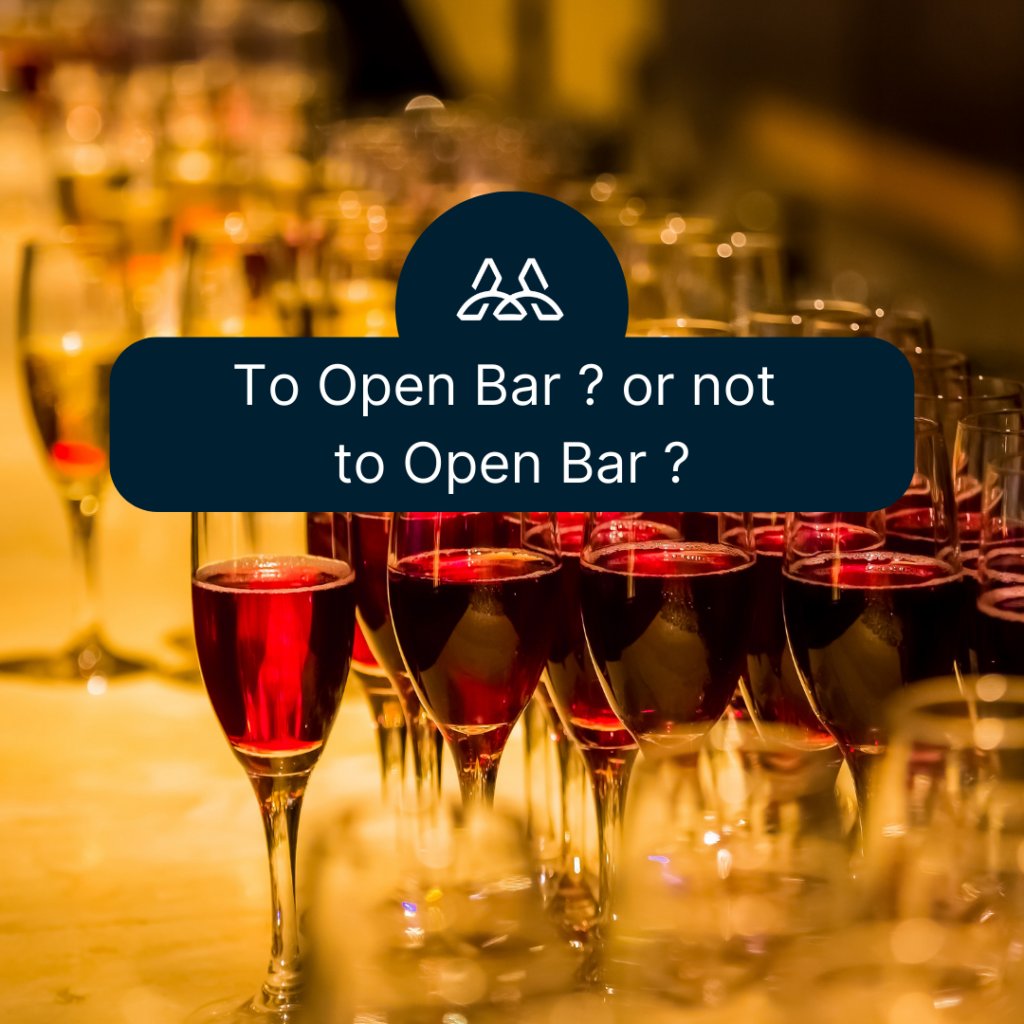
October 10th, 2023
🥂 Making the Right Call: Open Bar at Corporate Events 🥂
Event planning sometimes (always) comes with guiding a client with decisions that may seem trivial to most but have a great impact on many different aspects of any company. The open bar at an end of year party is often one of these subjects.
When it comes to planning a corporate function, the decision to have an open bar can be a strategic one, influencing the atmosphere, budget, and even the image projected to attendees. Let us not forget the responsibilities employers have as well.
Seeing as our planning efforts for end of year parties are well under way we thought we’d share some insights with you to help you navigate this decision-making process:
- Event Goals and Audience:
Every event has its purpose: a formal networking soirée or a team-building celebration. Tailor your choice to align with the event’s nature and your attendees’ preferences. The tone you set with the bar selection can significantly impact the overall experience.
2. Budget:
Budgets are the cornerstone of event planning. An open bar can be an enjoyable addition, but it’s crucial to consider associated costs. From alcohol to staffing to potential insurance, these expenses can add up. Ensure that your choice remains within budget while delivering an excellent experience.
3. Company Culture and Image:
Your company’s culture and image play a vital role in this decision. An open bar creates a relaxed and social environment, whereas a limited bar might be more suitable for a professional or formal culture. The bar setup should seamlessly integrate with your company’s values and the desired atmosphere.
4. Type of drinks available:
The drink menu you offer matters. Decide if you’ll provide a full range of beverages or stick to beer and wine. This decision can influence costs and logistics, making it a crucial consideration.
5. Alternatives to Alcohol:
Diversity matters. Consider offering intriguing non-alcoholic options like mocktails and unique soft drinks. This ensures inclusivity and caters to a broader range of preferences.
6. Duration of the Event:
Longer events may lead to increased alcohol consumption. If your function spans several hours, consider implementing limits or opting for a limited open bar to maintain control.
7. Location and Venue:
Collaborate with your chosen venue to understand any alcohol service restrictions or requirements. Venues might have their own policies that need to be adhered to.
8. Local Laws and Regulations:
Understanding local laws and regulations regarding alcohol service is essential. Timings and licenses might play a role in your decision-making. If your planning on limiting drink tickets and turing it into cash bar after a certain amount, make sure your venue is set up with proper licencing.
9. Communication:
Clear communication is key. Inform attendees of the bar setup ahead of time, whether it’s an open bar, limited selection, or purchase-based system.
10. Designated Drivers and Transportation:
Safety first. Arrange transportation options if alcohol is served, demonstrating your commitment to the safety and well-being of your attendees.
11. Feedback from Previous Events:
Past experiences provide valuable lessons. Gather feedback from previous events to understand the impact of the open bar and its role in the overall event experience.
12. Employer Responsibility:
As employers, we are responsible for creating a safe and enjoyable environment for our team. Providing solutions for the controlled consumption of alcohol showcases our commitment to protecting our people while ensuring a positive event experience.
Ultimately, the decision to include an open bar should be thoughtful, encompassing event goals, budget, and company culture. By keeping these considerations in mind, we can ensure that our corporate functions are memorable and aligned with our values.
Cheers to responsible and meaningful event planning! 🥳🍻